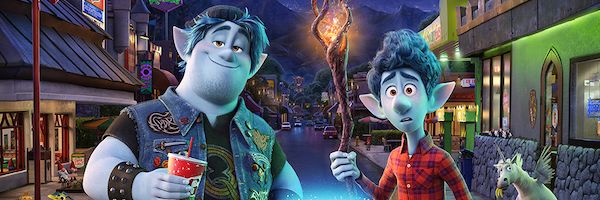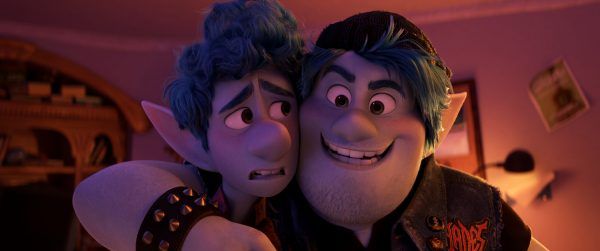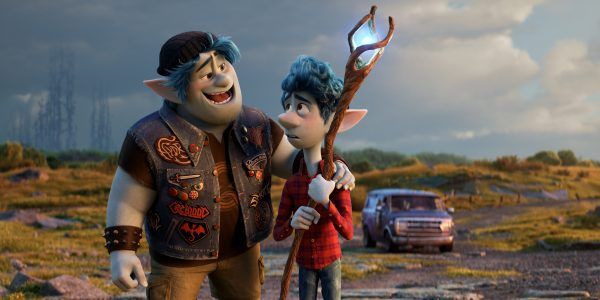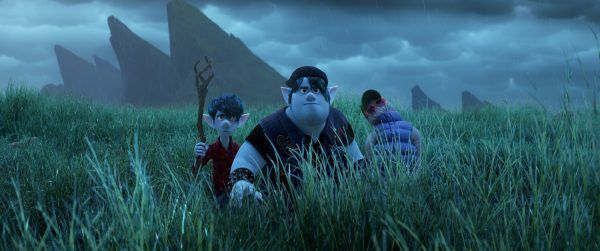Pixar’s latest animated feature Onward follows two teenage elf brothers, Ian (voiced by Tom Holland) and Barley (voiced by Chris Pratt), who embark on an extraordinary quest to discover whether there is still magic in the world. Upon Ian’s 16th birthday, the boys’ father, who died when they were too young to remember him, wanted them to be able to share one last day together, but when the spell doesn’t go quite as planned, they end up conjuring only their dad’s legs, and they have 24 hours to fully bring him back before he vanishes forever.
At the film’s Los Angeles press day, Collider got the opportunity to sit down and chat with writer/director Dan Scanlon and producer Kori Rae to talk about telling such a personal story (Onward is inspired by Scanlon’s own family story), the importance of telling a story about brothers who love each other, how Tom Holland and Chris Pratt helped their characters evolve, story changes, the last character that was added, how the trash unicorns came about, telling a full story arc for a van, when they knew the story’s ending, and what sort of Onward representation they’d like to see in the Disney theme parks.
Collider: When you spend six years on a project, and then it’s all finished, what’s the day after that like? What do you do?
DAN SCANLON: We finished, and went out and had a drink and talked. And then, the next morning, I went and met my wife, who was getting her hair done. We just had a normal day. But it is weird to think about.
KORI RAE: It’s true. I did laundry, or something exciting.
SCANLON: But it feels amazing, and it feels like such a catharsis and such a weight lifted. It’s like, “Okay, that project is okay. It’s on the shelf. We don’t touch it anymore. It doesn’t need anything from us anymore.”
RAE: It also feels kind of not real, to be honest with you. I would find myself going, “It’s not really done,” because you have lived with it, every minute, 24/7. It takes a while for your brain to comprehend that it actually really is over, at least for me.
Frozen and Frozen II highlighted the relationship between sisters, and now Onward is doing that for brothers. How does it feel to be giving something like this to all of the brothers out there?
SCANLON: Maybe from a sensitivity point of view, seeing brothers being caring and emotional and loving toward each other is nice. Seeing brothers not always pounding on each other and giving each other a hard time is nice.
RAE: Yeah, that emotion is really nice, and it’s very intentional. It’s what we wanted, early on.
Dan, because this was such a personal story for you, what was it like to actually tell your family about this film, and then to show it to them?
SCANLON: I talked to my mom about it from the very beginning, ‘cause it’s very much her story and she’s gone through so much. My mom is a great storyteller and super funny, and she was really helpful for me. My brother, I kept in the dark about it ‘cause I was making it for him. He knew little bits, here and there, and he generally knew that it was based loosely on our family, but he saw it, for the first time, two weeks ago, and he was blown away. I feel like, of course he loved it because he’s that kind of brother. He’s the kind of brother who was gonna love it, but it’s really opened up some great emotional things for us. My mom sees it next week [this interview was conducted on February 14th], so that’s the next step, and I’m curious about that. And then, the floodgates of secondary family see it, and that’s where the real drama ensues.
Were there any specific little details about your brother that you were most excited about getting into the film?
SCANLON: There are super small ones, that I don’t even think he recognized. Some of them are spoilery. I don’t know that there were a lot of details. I think it was so much about the big comment and the big thank you.
Kori, as a producer, is it more challenging, when you’re working with somebody who’s telling such a personal story?
RAE: Actually, no. It actually made it easier and better. It made it better because the story, and where we wanted to go and the story we wanted to tell, was rooted in truth and rooted in the real thing. That’s always super helpful to have at the core. The truth is, there were times during the story process when Dan would even be reluctant to be making something very, very specific to his life or his relationship. And so, myself and the other story members would really encourage them to tell us more and give us an example. We would try to pull it out because that’s going make the film richer. Even if you’re not using a specific thing, it’s the feeling of the thing. You might change some of the parameters of whatever the thing was, but it was incredibly helpful, and I really loved it. I think it made our jobs, with the story, a little bit easier.
Since these movies are always evolving, what did getting Chris Pratt and Tom Holland mean for this? Having two such big personalities, how did they affect the film and their characters?
SCANLON: Oh, in wonderful ways. Our early versions of Ian, before Tom was involved, were a little bit more sarcastic and sly, with little one-off comments, here and there. Tom didn’t do that, and he didn’t want to do that. He played all of those lines so sincerely and sweetly, and we realized, “Oh, my god, of course, Ian wouldn’t be that kind of guy. He’s a shy guy.” That sincerity made the character more real and more vulnerable. And then, Barley has to be, at times, frankly, a little annoying to Ian, but you don’t want to watch somebody be annoying. Chris can do that in a comic way, where it’s funny and fun to watch. Chris was also a bit of a guardian to Barley. Barley would do goofball, crazy things, which was fun, but if it went too far, Chris was pretty quick to go, “Well, he’s not out of his mind.” He gave Barley a context for everything he was trying to do, and that was really important.
Were there major story changes, along the way? Was there anything that really drastically changed?
SCANLON: We had a character who was going along on the journey with the boys, who was a third character that they met along the way. There wasn’t really conflict in the movie until that character showed up, and the boys would fight with them. And then, at some point, we realized, “Well, this character should just be one of them.” The boys weren’t really having a story without this other person, and that happens a lot. When we’re developing movies, for whatever reason, you’ve just scared to add those qualities to your main characters, so you need a Hamburger Helper character to come along and cause a problem. Eventually, we combined those qualities, mainly into Barley, and suddenly, it was a family road picture again. We loved that character, so it was a bummer, but that happens.
What was the last character that ended up coming into the story?
SCANLON: I think it was Grecklin, who is a wonderful role by Tracey Ullman. When the mom and the Manticore are on their journey, they stop off at a pawn store to get an important object. It was very late in the movie, and she’s this gobliny creature. She runs this pawn shop, and she’s really untrustworthy and slimy. It was such a joy to work with Tracey Ullman. She’s the funniest person, just the voices she can do. I think she did the whole thing in two or three different voices, and we could just pick. And the animators had a ball, animating her stuff.
RAE: We designed and modeled her in a few weeks. It was really fast.
SCANLON: Sadly, there are no toys of her because she came in late.
How did the idea for the trash unicorns come about?
SCANLON: We would just get together with groups of story artists and say, “What would be a funny twist on a fantasy thing?” I don’t even remember who did it. One of the story artists, who was just helping out for the gag session that day, slid across a picture of unicorns, all over the place, eating garbage. The idea that one thing that was so rare and so special in this world would be everywhere and taken for granted. It sums up a lot of the movie, in a great way.
RAE: In a very succinct way, yeah.
What are the challenges in telling a full story arc for a van?
SCANLON: I’m glad you said that. We thought of her as a character, and we did try to give her an arc. It was very important that Barley created her and is proud of her. She’s an accomplishment of his, that he wants to share, and he also loves her. Also, Ian doesn’t, and he’s a little frustrated by her and embarrassed, and you get to see him learn to love her. It’s a very important character because it leads to an important part of the story that’s a major turning point for Ian and Barley and their relationship.
At what point in the process did you land on the ending for this? Did you know what you wanted the ending to be, and then had to work toward that?
RAE: We knew the ending and had to work, all of these years, to get there. It’s way better than [not knowing].
SCANLON: We kept saying, “This is our North Star. We know where we’re headed. We have no idea how to get there, but at least we know there’s something waiting at the end of the rainbow.”
RAE: It’s a real anchor, when you have that. I’ll take that, any day, over the opposite.
So, if magic were real and you could be in control of creating your own Disney Park ride, strictly for Onward, what would you want it to be?
RAE: Man, I would want to go down the Lazy River on a Cheeto. I like slow rides.
SCANLON: I would just want the Manticore’s Tavern to be a real restaurant, and it could burst into flames, every hour. The Manticore could come out throwing stuff, and everyone would run out screaming. I’d love that. Even when we were doing the Tavern we said, “This would be so cool.”
RAE: It’d be amazing if that could be a restaurant at Epcot.
Onward opens in theaters on March 6th.




